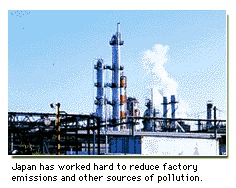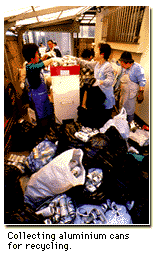 |
 Japan's rapid economic growth in the 1960s was accompanied by polluted air and rivers and growing environmental hazards. Pollution became a major social problem, causing many illnesses. Japan's rapid economic growth in the 1960s was accompanied by polluted air and rivers and growing environmental hazards. Pollution became a major social problem, causing many illnesses.
As a result, the public began to advocate environmental protection. Environmental standards were established with the enactment of the Basic Law for Environmental Pollution Control in 1967. In 1971 the Environment Agency was set up, and efforts to prevent pollution and promote environmental protection began in earnest. Companies strove to meet environmental standards and develop antipollution technologies. Gradually Japan's air and rivers became cleaner. |
 In the meantime, the garbage problem has become serious. The Ministry of Health and Welfare reports that the amount of waste households and offices produce is equivalent to each Japanese resident throwing out 1.1 kilograms of trash every day; and the mountain of garbage seems to be growing year by year. In the meantime, the garbage problem has become serious. The Ministry of Health and Welfare reports that the amount of waste households and offices produce is equivalent to each Japanese resident throwing out 1.1 kilograms of trash every day; and the mountain of garbage seems to be growing year by year.
Waste produced by factories and at construction sites also continues to rise, and there is a shortage of landfills. The government and civic groups are promoting recycling, and the share of newspapers and beverage cans that are recycled is reaching high levels. In cooperation with other industrialized countries, Japan is also trying to address global problems, such as pollution of seawater and warming of the earth caused by massive emissions of carbon dioxide. To developing countries, it is actively providing economic and technological assistance aimed at ensuring that national development does not come at the expense of the environment.
Photos courtesy of Ministry of Foreign Affairs and Tokyo Metropolitan Government.

|
